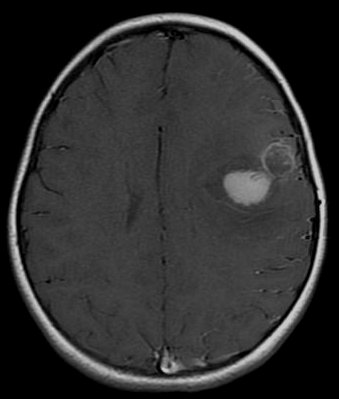Primitive Neuroectodermal Tumour
Primitive Neuroectodermal Tumour (PNET) is a malignant neural crest tumour, primarily affecting children and young adults under 25 years of age. With an overall 5-year survival rate of approximately 53%, it is a significant concern within paediatric oncology. PNETs belong to the Ewing family of tumours and are characterised by their primitive appearance due to the lack of differentiation in neuroectoderm-derived cells.

Genetics
Research has used gene transfer of SV40 large T-antigen in neuronal precursor cells of rats to establish a PNET brain tumour model. These models are histologically similar to human PNETs and have been instrumental in identifying genes involved in human brain tumour carcinogenesis. For example, the model has confirmed the involvement of the p53 gene in human medulloblastomas. However, since only about 10% of human tumours exhibit mutations in p53, the model is also used to look at other binding partners of the SV40 Large T-antigen, beyond just p53.
Diagnosis

Classification
PNETs are classified based on their location in the body into two main types: peripheral PNET and CNS PNET.
Peripheral PNET
Peripheral PNET (pPNET) is now considered virtually identical to Ewing sarcoma. Based on current evidence, both Ewing's sarcoma and PNET share a similar neural phenotype and identical chromosome translocation. They should therefore be viewed as the same tumour, differing only in their degree of neural differentiation. Tumours showing neural differentiation through light microscopy, immunohistochemistry, or electron microscopy are traditionally labelled PNETs, whereas those that are undifferentiated are diagnosed as Ewing's sarcoma.
PNET of the CNS

CNS PNETs generally refer to supratentorial PNETs. Historically, medulloblastomas were considered PNETs; however, they are now recognised as genetically, transcriptionally, and clinically distinct. Therefore, "infratentorial" PNETs are now referred to as medulloblastoma. Pineoblastomas, which originate in the pineal gland, are also likely distinct from supratentorial PNETs.
Treatment
The management of CNS PNET involves a multi-faceted approach. Initially, detailed imaging through MRI, as well as additional scans (X-ray, CT, PET, and bone marrow biopsies) are essential to look for metastasis or associated malignancies. A biopsy is then necessary for confirming the diagnosis.
Once a CNS PNET diagnosis is confirmed, management typically includes neoadjuvant chemotherapy and radiation to reduce tumour size. This is followed by complete surgical resection with confirmed negative margins. Post-surgical, adjuvant chemotherapy may be administered to ensure comprehensive treatment. Given the aggressive nature of CNS PNET, a rigorous and thorough approach is required. Additionally, palliative care services should be integrated into the patient's care team upon diagnosis to provide holistic support.
Self-assessment MCQs (single best answer)
What is the primary age group affected by Primitive Neuroectodermal Tumour (PNET)?
What is the overall 5-year survival rate for patients with PNET?
PNETs belong to which family of tumours?
What gene has been confirmed to be involved in human medulloblastomas through the rat PNET model?
What percentage of human PNET tumours exhibit mutations in the p53 gene?
How are peripheral PNETs and Ewing's sarcoma currently viewed based on their characteristics?
Which type of PNET is now recognised as genetically, transcriptionally, and clinically distinct from other PNETs?
What is the initial step in the management of CNS PNET?
Which method is used to confirm the diagnosis of CNS PNET?
In addition to neoadjuvant chemotherapy and radiation, what is a very important part of CNS PNET treatment?
Dentaljuce
Dentaljuce provides Enhanced Continuing Professional Development (CPD) with GDC-approved Certificates for dental professionals worldwide.
Founded in 2009 by the award-winning Masters team from the School of Dentistry at the University of Birmingham, Dentaljuce has established itself as the leading platform for online CPD.
With over 100 high-quality online courses available for a single annual membership fee, Dentaljuce offers comprehensive e-learning designed for busy dental professionals.
The courses cover a complete range of topics, from clinical skills to patient communication, and are suitable for dentists, nurses, hygienists, therapists, students, and practice managers.
Dentaljuce features Dr. Aiden, a dentally trained AI-powered personal tutor available 24/7 to assist with queries and provide guidance through complex topics, enhancing the learning experience.
Check out our range of courses, or sign up now!


